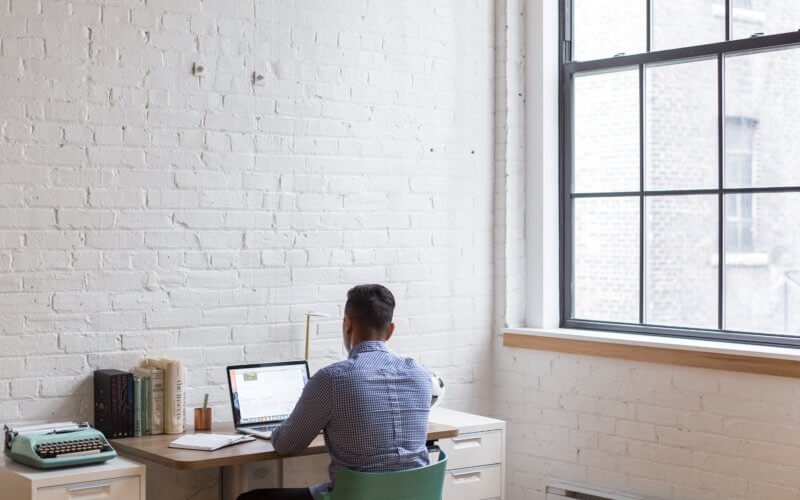Work from home and sleep

So you used to envy those who worked from home and could stay in their pj’s all day. Still jealous now? Just like working from an office, working from home has its own pros and cons. And a big con? Figuring out the perfect routine, especially a sleep schedule. Without paying attention to how your actions could affect your sleep, you could have more trouble sleeping. If you have trouble sleeping, you could have less energy and concentration to work. It’s quite a cycle.
So how do you work from home and sleep well? We’re here to help you out.
The key is to make a routine, with schedules you can stick to.
Routine:
Sleep schedule:
Go to bed and wake up at the same time each day. This also means no snoozing the alarm and no staying up too late. You want to keep your circadian rhythm in check.
Your circadian rhythm is your own, personal biological clock. It lasts around 24 hours and runs through different amounts of energy and sleepiness. For example, if you consider yourself a “morning person,” you feel surges of productivity in the morning. By midday, you might feel yourself slowing down. If you’re more a “night owl,” this might be your chance to see if that 9-5 schedule isn’t working for you.
So, in order to be at your best, it makes sense to sleep and work according to when you feel the most energetic and productive.
Work schedule:
Give yourself a real start and end time for working. You need a transition from home to work-from-home you. Don’t just jump into work in the morning because you see your desk, and don’t just keep going because now you don’t need to commute back.
You can create this distinction by finding transition activities, like listening to a podcast, exercising or reading a book, to replace your normal commute.
Food schedule:
Plan out a time to have breakfast, lunch, dinner, etc. This will allow you to take meaningful breaks as well as give yourself the necessary energy to power through the day. This scheduling also allows you to keep some normalcy, as it’s part of your old routine. Now, you might also have more time to try out new recipes, or bond with family and friends at the dinner table. Just make sure you eat at least 2 hours before heading to bed.
Fitness schedule:
Figure out when to get some movement in. It can give you surges of energy and also have a positive effect on your mood. You could work out before work, during a break, or right after. Just don’t do strenuous physical activity shortly before sleeping.

New Traditions
Now that you have your schedules down, find some things about working from home that are unique. You’ll appreciate it more if you can develop your own traditions from this time away from the office.
You can add things to your day, which are screen-free, like:
Meditation- great for sleeping, but also de-stressing in general.
Playlists- make themed playlists for each day of the week, or for each month. Get creative– finally, you get to choose what to groove to.
Journaling- use your usual commute time to connect more with yourself.
Reading- no more excuses! Hop on Goodreads and start making a reading goal.
Relish in a nice coffee or tea break– no caffeine at least 5 hours before bed, though!
Office vs. Bed
An important tip is make your work space as office-like as possible. This means no work in bed, or in the bedroom. If you are in a tiny studio, this might not be possible. If space is tight, try to create any type of physical divide between your work station and your living area.
No matter what, it is important to keep work and sleep as separate as you can. You don’t want to be glancing at your monitor and a new Slack message right as you’re about to sleep.

As Zoom has replaced meetings, it is also important to note how much more of your time is spent staring at screens. Not only will your eyes strain, the blue light will make it harder for you to fall asleep. Blue light exposure during the hours before bedtime blocks melatonin from being released. Because you’ve been working all day on the screen, go screen-less in your spare time.
Lastly, in our post on sleep during the lockdown, we mentioned that people are going to bed later and waking up later. If you are still doing this, make sure that this sleep schedule works for you. Different people are different chronotypes, or they have energy bursts at different times during the day.
Main takeaways
How are work from home and sleep related?
By working and sleeping in the same area, we risk losing the quality of our sleep. It is important to separate these two parts of our day as much as we can.
Why is a routine so important for work from home?
By giving yourself specific times for sleeping, working, eating, etc., you can give your days the structure they are used to having. You will make sure you have the energy you need to push through the day.
Why is it important to limit screen time?
Now, work consists of spending hours looking at the screen. During your free time, you can avoid screens. Blue light exposure during the hours before bedtime makes it harder for your body to sleep, as it prevents melatonin from being released.
Discover your sleeper profile with this sleep test
Start



